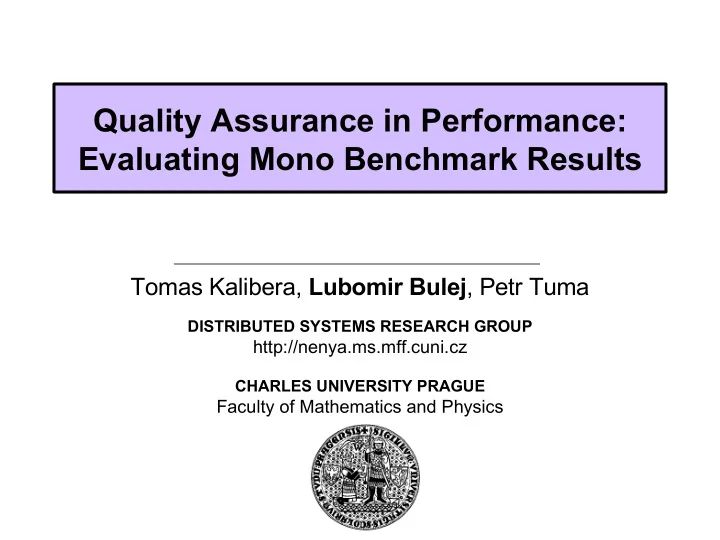

Quality Assurance in Performance: Evaluating Mono Benchmark Results Tomas Kalibera, Lubomir Bulej , Petr Tuma DISTRIBUTED SYSTEMS RESEARCH GROUP http://nenya.ms.mff.cuni.cz CHARLES UNIVERSITY PRAGUE Faculty of Mathematics and Physics
Agenda • Regression benchmarking Motivation, basic idea, requirements Expectations and surprises Statistical evaluation • Application to Mono project Selected benchmarks and results Tracing changes back to code Identified and verified regressions • Conclusion Evaluation of the approach Future work T. Kalibera, L. Bulej SOQUA 2005, Erfurt, Germany
Performance: A Neglected Aspect of Quality. • Motivation Functional regression/unit testing Nonfunctional/performance testing neglected • The goal: regression benchmarking Regularly test software performance Detect and report performance changes • Basic idea Benchmark daily development versions Detect changes in benchmark results • Requirements Fully automatic Reliable and easy to use T. Kalibera, L. Bulej SOQUA 2005, Erfurt, Germany
Surprise: Repeating operations does not help.
Expectation: Repeating operations helps.
Even Worse: The instability has layers. • Download a new software version • Build a benchmark with the new version • Run a benchmark m times Start a new operating system process Warm-up the benchmark Invoke the same operation n times Report individual operation response times • Collect and analyze the results T. Kalibera, L. Bulej SOQUA 2005, Erfurt, Germany
Solution to Instability: Statistics. • Model benchmark as a random process Model instability by randomness Model layers of instability by hierarchical random variables • Collect representative data Repeat builds, runs and operations Benchmark result is estimate of a model parameter of interest (i.e. overall mean) Result precision – precision of the estimate T. Kalibera, L. Bulej SOQUA 2005, Erfurt, Germany
Statistical Evaluation: Current solution. • Statistical model Two-layer hierarchical, robust Parameter of interest is the mean, estimated by average, precision is confidence interval length Allows to specify optimum number of operations for maximum precision • Change detection Non-overlapping confidence intervals T. Kalibera, L. Bulej SOQUA 2005, Erfurt, Germany
Mono Benchmarking: Proof of Concept. • Mono Project Open-source .NET platform by Novell, http://www.mono-project.com Includes C# compiler, virtual machine, application libraries • Mono Benchmarking Project Fully automated benchmarking of Mono with detection of performance changes Daily updated results since August 2004, http://nenya.ms.mff.cuni.cz/projects/mono T. Kalibera, L. Bulej SOQUA 2005, Erfurt, Germany
Mono Benchmarks. • FFT SciMark Uses floating point operations, memory Measures FFT computation time • Rijndael Uses .NET Cryptography Measures Rijndael encryption/decryption time • TCP Ping and HTTP Ping Use .Net Remoting Measure single remote method invocation T. Kalibera, L. Bulej SOQUA 2005, Erfurt, Germany
HTTP Ping: Detected performance changes.
HTTP Ping: Detected performance changes. Newer Version Older Version Change Impact[%] 2004-08-17 2004-08-13 -9.67 % 2004-08-18 2004-08-17 -10.44 % 2004-12-20 2004-12-01 19.64 % 2005-03-02 2005-02-28 -7.81 % 2005-03-07 2005-03-04 7.77 % 2005-04-05 2005-04-04 39.29 % 2005-05-03 2005-04-12 -47.47 % T. Kalibera, L. Bulej SOQUA 2005, Erfurt, Germany
Mono: Finding causes of performance changes. • Manual inspection Focus on modified source files, change logs • Modifications in application libraries Focus on source files used by the benchmark code (automated restricted diffs) If it does not help, look into VM or compiler • Verification Create intermediate versions (1-2) Benchmark and detect changes with new versions T. Kalibera, L. Bulej SOQUA 2005, Erfurt, Germany
Mono: Verified causes of performance changes. • Performance improvements 99% - buffering network communication, TCP Ping 17% - improved switching between native and managed code, FFT SciMark • Performance degradations 40% - introducing i18n in string case conversion, HTTP Ping 24% - introducing loop optimization in JIT into default options, FFT SciMark T. Kalibera, L. Bulej SOQUA 2005, Erfurt, Germany
Conclusion. • Mono benchmarking suite Fully automated benchmarking with detection of changes, publicly available results • Automated analysis Independent on Mono, robust, allows planning of experiments • Future Work Even more robust analysis method Semi-automated tools for discovering causes of performance changes T. Kalibera, L. Bulej SOQUA 2005, Erfurt, Germany
FFT SciMark: Detected performance changes.
Rijndael: Detected performance changes.
TCP Ping: Detected performance changes.
Impact of process initialization random effects. Impact Benchmark Platform Factor FFT Pentium/Windows 94.74 FFT Itanium/Linux 35.91 FFT Pentium/Linux 25.81 FFT Pentium/DOS 1.06 RPC Marshaling Pentium/Linux 2.61 RPC Ping Pentium/Linux 1.10 RUBiS Pentium/Linux 1.01 T. Kalibera, L. Bulej SOQUA 2005, Erfurt, Germany
Publications. • Kalibera, T., Bulej, L., Tůma, P.: Quality Assurance in Performance: Evaluating Mono Benchmark Results , accepted as a full paper on Second International Workshop on Software Quality (SOQUA 2005), Erfurt, Germany • Kalibera, T., Bulej, L., Tůma, P.: Benchmark Precision and Random Initial State , in Proceedings of the 2005 International Symposium on Performance Evaluation of Computer and Telecommunications Systems (SPECTS 2005), SCS 2005 • Bulej, L., Kalibera, T., Tůma, P.: Repeated Results Analysis for Middleware Regression Benchmarking , Performance Evaluation: An International Journal, Performance Modeling and Evaluation of High-Performance Parallel and Distributed Systems, Elsevier, 2005 • Bulej, L., Kalibera, T., Tůma, P.: Regression Benchmarking with Simple Middleware Benchmarks , proceedings of IPCCC 2004 Mid- dleware Performance Workshop, IEEE 2004 • Kalibera, T., Bulej, L., Tůma, P.: Generic Environment for Full Automation of Benchmarking , in proceedings of First International Workshop on Software Quality (SOQUA 2004), LNI 2004 T. Kalibera, L. Bulej SOQUA 2005, Erfurt, Germany
Recommend
More recommend